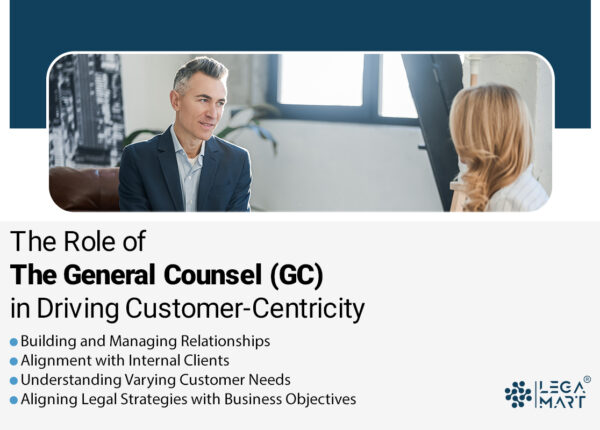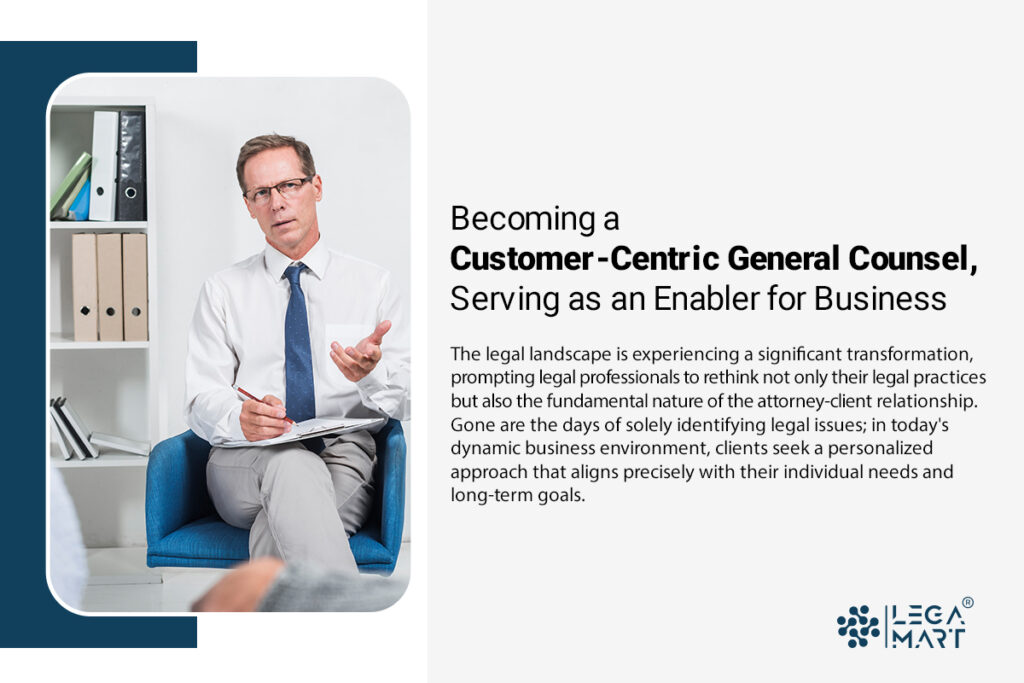Adam Glick, head of legal at Intercom, began his career as a commercial attorney, negotiating license agreements and other commercial transactions. Over time, he transitioned into managing commercial teams and legal departments, gaining exposure to diverse legal matters and becoming a well-rounded specialist. This background led him to his first head of legal role at Intercom, where his expertise in commercial law and broad legal knowledge proved invaluable.
As a head of legal, Adam focuses on being customer-centric, understanding the needs and perspectives of both internal stakeholders and external customers. His perspective is that without customers and revenue, typically, there’s no company to provide legal service. Therefore, he believes that building strong relationships with customers and their legal teams is essential for success, emphasizing the importance of aligning legal strategies with customer values. Furthermore, Adam stresses the significance of being customer-focused in legal leadership roles, emphasizing the need for fostering relationships with customers, aligning with internal teams like sales, and adapting to the varying needs and risk tolerances of different customers. Ultimately, he believes that human connections are key to success in any role, including legal services.
Introduction
The legal landscape is experiencing a significant transformation, prompting legal professionals to rethink not only their legal practices but also the fundamental nature of the attorney-client relationship. Gone are the days of solely identifying legal issues; in today’s dynamic business environment, clients seek a personalized approach that aligns precisely with their individual needs and long-term goals. As a result, the role of a General Counsel (GC) has evolved beyond traditional legal duties, necessitating a customer-centric mindset, this is because achieving meaningful connections requires more than just showcasing legal expertise. Adam Glick exemplifies this shift with his customer-centric approach to legal leadership, which has proven to be a game-changer for medium-sized companies seeking growth and heightened customer satisfaction.
This shift in perspective goes beyond mere legal acumen; it is about building trust, fostering collaboration, and driving overall effectiveness in legal practice. Generally, embracing a client-centric strategy fosters trust, rapport, and overall effectiveness in legal practice. In this article, we explore the pivotal role of customer-centricity in modern legal leadership and how it empowers GCs to drive growth, enhance customer satisfaction, and navigate the intricacies of today’s business landscape with agility and precision.
How do you Define Client-Centricity?
Being customer-centric means focusing on the customer above all else. It involves making business decisions and strategies based on what’s best for the customer, rather than just what benefits the company.
In the legal realm, being customer-centric goes beyond seeing clients as transactions or sources of billable hours. It’s about treating them as partners in a shared journey, understanding their unique needs, concerns, and goals. A good example is the DLA Piper, a global law firm, that proposed a Book Club on client-centric culture, which focused on client service and growth; exemplifying the firm’s commitment to a client-centered approach.
From a General Counsel’s (GC) perspective, client-centricity involves organizing the business and managing service delivery with the client’s viewpoint in mind. It means prioritizing what’s best for the client, not just what’s convenient for the business. A General Counsel should consider standing in the client’s shoes, meaning, considering their entire experience of working with the company beyond the legal advice or technical analysis offered.
Understanding the Customer-Centric Mindset from a General Counsel’s Perspective
A customer-centric GC prioritizes the needs and experiences of the company’s customers, viewing legal services as a strategic asset rather than merely a risk mitigation tool. This mindset shift requires a deep understanding of the customer journey, identifying touchpoints where legal input can positively impact customer interactions and product offerings.
Adam Glick’s approach to being a customer-centric General Counsel (GC) offers a refreshing and innovative perspective on the role of legal leadership within a business. This approach goes beyond traditional legal responsibilities, focusing on understanding and prioritizing the needs and experiences of the company’s customers. By adopting this mindset, a GC like Glick views legal services not just as a means to mitigate risk, but as a strategic asset that can enhance customer satisfaction and drive business growth.
Glick’s customer-centric methodology involves a deep dive into the customer journey, identifying touchpoints where legal input can improve customer interactions or product offerings. This could mean simplifying contract language to make it more accessible to customers, ensuring compliance in a way that enhances customer trust, or proactively addressing potential legal issues before they impact the customer experience. By doing so, the GC’s role transcends traditional boundaries, contributing directly to the company’s value proposition and competitive edge.
In embracing a customer-centric approach, Glick demonstrates the importance of aligning legal strategies with business objectives to foster a positive corporate environment. This perspective encourages collaboration across departments, breaking down silos between legal, marketing, product development, and customer service teams. It also underscores the significance of innovation in legal processes, leveraging technology and data analytics to better serve customer needs. Ultimately, becoming a customer-centric GC requires a mindset shift towards proactive engagement, strategic thinking, and a relentless focus on delivering value to customers through every aspect of the company’s operations.
The Role of the General Counsel (GC) in Driving Customer-Centricity

Being customer-centric is essential for a General Counsel due to several reasons deeply intertwined with the organization’s success and sustainability. By effectively balancing organizational risk with revenue opportunities and optimizing legal expenditures, General Counsels can provide valuable insights into enhancing the overall success and sustainability of the organization. Therefore, focusing on existing client relationships is economically advantageous, as client attrition costs legal businesses significantly more than retaining and expanding existing client relationships. Research indicates that client-centric businesses tend to be more profitable, underscoring the importance of prioritizing customer relationships for GCs. A General Counsel can impact customer-centricity of an organization in various ways including;
-
Building and Managing Relationships:
GCs must prioritize building and managing relationships not only with external customers but also with their legal counsel. Strong relationships with customers and their legal representatives are essential for fostering trust, open communication, and collaboration. By actively engaging with customers and their counsel, GCs can better understand their unique legal needs, concerns, and objectives, ultimately leading to more effective legal support and guidance.
-
Alignment with Internal Clients:
In addition to external relationships, GCs must align closely with internal clients, particularly the sales team. By collaborating with internal stakeholders, such as sales representatives, GCs can ensure that legal strategies and initiatives are aligned with customer success goals. This alignment facilitates a seamless customer experience, as legal considerations are integrated into sales processes and customer interactions.
-
Understanding Varying Customer Needs:
In an increasingly competitive legal landscape, clients expect personalized and tailored legal services that address their unique needs and challenges. Therefore, understanding varying client’s needs is crucial for General Counsels (GCs) to adopt a client-centric approach. Every customer is unique, with distinct legal requirements, preferences, and risk tolerance levels. By considering and accommodating these differences, GCs can enhance customer satisfaction, loyalty, and retention.
Furthermore, tailoring legal solutions to meet the specific needs of each client not only differentiates the organization from competitors but also attracts and retains clients. It positions the organization as a trusted advisor and partner. Additionally, understanding varying risk tolerance levels enables GCs to strike the right balance between legal compliance and business objectives, ensuring that legal advice aligns with customers’ risk preferences.
-
Aligning Legal Strategies with Business Objectives
To become a customer-centric GC, it is crucial to align legal strategies with the company’s overall business objectives. This alignment fosters a positive corporate environment, encouraging collaboration across departments and breaking down silos between legal, marketing, product development, and customer service teams. By working in sync with other departments, a GC can contribute directly to the company’s value proposition and competitive edge.
For a General Counsel (GC) to truly embrace a customer-centric approach, aligning legal strategies with the company’s overall business objectives is paramount. This strategic alignment ensures that legal initiatives not only mitigate risk but also actively contribute to the organization’s growth, competitiveness, and customer satisfaction.
One of the key benefits of aligning legal strategies with business objectives is the promotion of cross-functional collaboration. By working closely with departments such as marketing, product development, and customer service, a customer-centric GC can gain valuable insights into customer needs, preferences, and pain points. This knowledge enables the legal team to develop strategies that not only protect the company but also enhance the customer experience.
For example, when Apple Inc. launched its iPhone, the company’s legal team worked closely with product development and marketing to ensure that user agreements and privacy policies were transparent, user-friendly, and aligned with the company’s brand promise of simplicity and customer-centricity. This collaboration helped Apple build trust with its customers and differentiate itself in a highly competitive market.
Aligning legal strategies with business objectives also helps break down silos between departments, fostering a more cohesive and customer-centric corporate culture. When legal teams are seen as partners in achieving business goals, rather than obstacles to be overcome, it encourages open communication and knowledge sharing across the organization.
A case in point is Cisco Systems, where the legal department has implemented a “client engagement model” that assigns dedicated legal support to each business unit. This model ensures that legal strategies are tailored to the specific needs of each unit and facilitates regular communication between legal and business leaders. As a result, Cisco’s legal team is better equipped to support customer-facing initiatives and respond quickly to changing market conditions.
By aligning legal strategies with business objectives, a customer-centric GC can directly contribute to the company’s value proposition and competitive edge. This involves proactively identifying legal opportunities and risks that may impact the customer experience and working with cross-functional teams to develop innovative solutions.
An excellent example of this is Airbnb’s approach to navigating the complex regulatory landscape of short-term rentals. The company’s legal team works closely with government relations and public policy teams to advocate for fair and clear regulations that protect both hosts and guests. By proactively shaping the legal environment in which it operates, Airbnb has been able to expand its services, attract new customers, and build a strong brand reputation for trust and safety.
To ensure that legal strategies are effectively aligned with business objectives, customer-centric GCs must measure success using metrics that go beyond traditional legal key performance indicators (KPIs). This may involve tracking customer satisfaction scores, net promoter scores, and customer lifetime value, as well as monitoring the impact of legal initiatives on revenue growth and market share.
For instance, when Microsoft’s legal department implemented a new contract management system, they tracked not only the reduction in contract cycle times but also the impact on customer onboarding and retention rates. By demonstrating the direct link between legal process improvements and business outcomes, Microsoft’s legal team was able to secure additional resources and support for future customer-centric initiatives.
Strategies for General Counsels to Foster a Customer-Centric Approach

To ensure that General Counsels prioritize their clients and adopt a customer-centric mindset, here are some best practices that they can employ:
-
Get to Know the organization:
As General Counsels, it is crucial to take the initiative to familiarize with the organization that they are working for by delving deeper into your organization’s operations, including its customer base, products, business strategies and competitors. This may entail working with the legal team and spending time working directly with customers. This hands-on experience will help General Counsels gain a thorough understanding of the company’s operations. Additionally, general counsels can look for opportunities to immerse themselves in the organization’s business activities, such as attending important meetings, shadowing key clients, participating in internal training sessions, and using the company’s products or solutions.
-
Swift and Tailored Responsiveness:
General Counsels (GCs) recognize the importance of swift and personalized responses in customer service, aiming to provide the same level of responsiveness to their internal business clients as they expect from their own service providers. Acknowledging client inquiries promptly, ideally within hours, and providing realistic timelines for resolution are essential to cultivate trust in their legal guidance. Tailoring responses to individual client preferences using various communication mediums further reinforces their commitment to serving as trusted advisors within the organization.
-
Understand Clients:
General counsel should dedicate time to familiarize themselves with clients, including their backgrounds, interests, and preferences. Building professional relationships with clients allows the General Counsel to better empathize with their viewpoints and requirements. On the other hand, when engaging with new clients, it is important to take the initiative to reach out, introduce themselves and actively listen to their needs, as well as expressing their readiness and willingness to provide assistance.
-
Enhance Legal Services:
General counsel should strive for a more strategic approach when providing legal services to business clients. Most General Counsels typically operate in a reactive manner to address various inquiries, thus, it is important to make a conscious effort to proactively share insightful knowledge and lessons learned consequently empowering the clients to become more agile and informed, hence increasing the value that they deliver to clients.
-
Adopt Strategic Risk Management:
General counsel can significantly enhance the value of their legal services by assisting clients in navigating strategic risk-taking. Particularly, when advising their business clients, it’s crucial to recognize that the clients often seek insight into the practical risks associated with their decisions, rather than just theoretical ones.
Enhancing Customer Experience Through Legal Innovation
Legal innovation is the introduction of new ideas, methods, technologies, or approaches within the legal industry to improve the delivery of legal services, enhance efficiency, and address evolving client needs. It encompasses a wide range of initiatives, including the adoption of technology-driven solutions i.e using legal technology to meet clients’ demands; process improvements; changes in organizational structure; and the development of new legal service delivery models.
A customer-centric approach to legal leadership demands innovation in legal processes. This may involve simplifying contract language to make it more accessible to customers, ensuring compliance in a way that enhances customer trust, or proactively addressing potential legal issues before they impact the customer experience.
Equally, as clients grow more proficient with technology and expect innovative solutions from their legal service providers, law firms that adeptly utilize technology to improve the client experience are poised to gain a competitive edge. By leveraging technology and data analytics, GCs can streamline legal processes and deliver value to customers more efficiently.
Proactive Engagement and Strategic Thinking
Becoming a customer-centric GC requires a proactive approach to legal matters. Instead of waiting for issues to arise, a forward-thinking GC anticipates potential challenges and works to prevent them from affecting customers. This proactive engagement involves strategic thinking, constantly seeking opportunities to improve the customer experience through legal initiatives.
Measuring Success Through Customer Satisfaction
A customer-centric GC measures success not only by traditional legal metrics but also by customer satisfaction. This may involve tracking customer feedback, monitoring social media sentiment, and collaborating with customer service teams to identify areas where legal improvements can enhance the overall customer experience. By prioritizing customer satisfaction, a GC can demonstrate the tangible value of legal leadership to the company’s bottom line.
Besides, when clients grasp the value that their legal teams provide in handling each matter, corporate counsel can cultivate deeper levels of trust. Through a clear understanding of the legal department’s measurable effectiveness, both the business and legal teams are inclined to collaborate in addressing bottlenecks, crafting innovative solutions to curb excessive legal expenditures, and foreseeing workflow demands to meet the business’s needs effectively and efficiently
Conclusion
Embracing a customer-centric approach to legal leadership, as demonstrated by Adam Glick, can be a transformative strategy for medium-sized companies. By aligning legal strategies with business objectives, innovating legal processes, and prioritizing customer satisfaction, a GC can become an enabler for business growth. This mindset shift requires a commitment to proactive engagement, strategic thinking, and a relentless focus on delivering value to customers through every aspect of the company’s operations. As the business landscape continues to evolve, customer-centric GCs will play an increasingly crucial role in driving success and differentiation for their organizations.
Aligning legal strategies with business objectives is a cornerstone of customer-centric leadership for General Counsels. By fostering cross-functional collaboration, breaking down silos, contributing to the company’s value proposition, and measuring success through business metrics, GCs can transform their legal departments into strategic enablers of customer satisfaction and business growth. As the examples of Apple, Cisco, Airbnb, and Microsoft demonstrate, when legal teams are fully aligned with business objectives, they can play a pivotal role in driving innovation, competitiveness, and customer loyalty in today’s fast-paced business environment.





